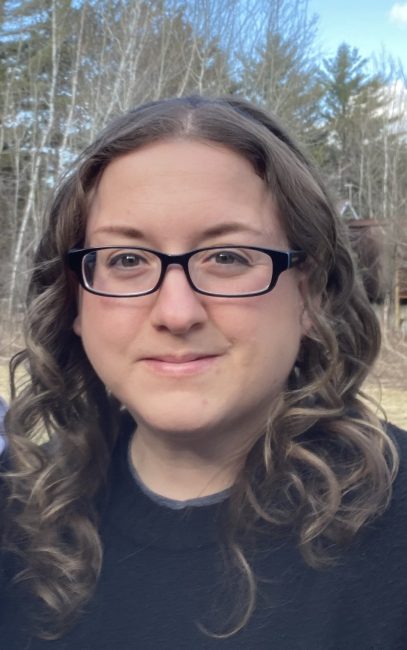Youth Creative Arts & Communication Expo
Important Information
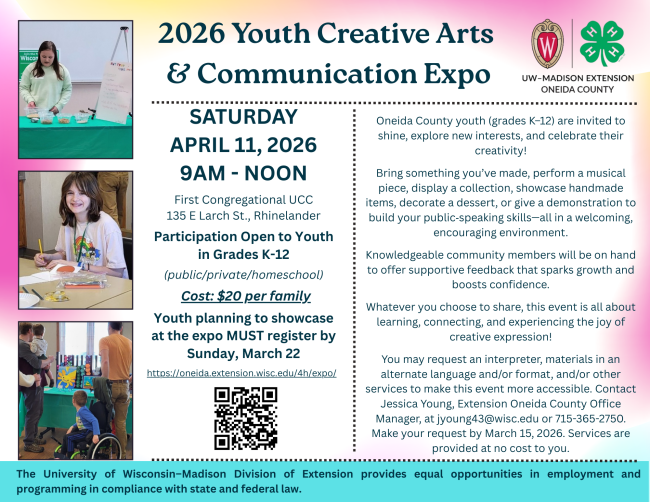
9 a.m. – 12 p.m. Saturday, April 11, 2026
First Congregational UCC
135 E Larch St., Rhinelander
Youth in grades K-12 (private/public/homeschool)
Program Fee: $20 per family
Financial assistance is available for those who need it. For support or questions, please contact Oneida County 4-H Educator Anne Williams.
You may request an interpreter, materials in an alternate language and/or format, and/or other services to make this event more accessible. Contact Jessica Young, Extension Oneida County Office Manager, at jyoung43@wisc.edu or 715-365-2750. Make your request by March 15, 2026. Services are provided at no cost to you.
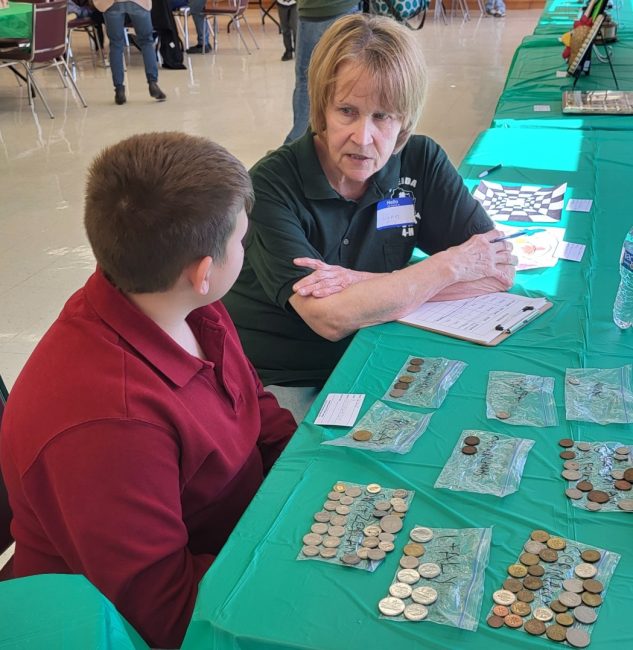
Get ready for a morning filled with creativity, confidence, and fun!
The Oneida County Youth Creative Arts & Communication Expo invites 4‑H youth to show off their talents, explore new interests, and discover the joy of creative expression.
Whether you love making things, performing, or sharing what you know, this event is the perfect place to shine. Youth are welcome to bring a project they made, play an instrument, showcase a collection, present handmade items like knitted or sewn creations, decorate a dessert, or step up to the mic to give a demonstration and practice public speaking.
Supportive community members will be available to offer positive, helpful feedback designed to encourage growth, spark new ideas, and build confidence.
No matter what you choose to bring or try, this event is all about learning, connecting, and celebrating your creativity. Participants leave feeling inspired—ready to keep exploring their current passions or dive into exciting new ones!
Registration is now OPEN through Sunday, March 22, 2026
Non 4-H Member Instructions: Text Version
THESE INSTRUCTIONS ARE MEANT FOR FAMILIES NOT ENROLLED IN 4HONLINE
Please follow these instructions closely, as they will ensure you register for 4HOnline correctly and will allow you immediate access to register for events within your profile. If you do not visit a page called events and click on the name of the event during the registration process, you have not completed registration. Call our office at 715-365-2750 if you need further assistance!
- Step 1: Register through 4HOnline:
- Choose the following options:
- State: Wisconsin
- Institution: Wisconsin 4-H Youth Development
- County: Oneida
- Enter the following information:
- Confirm Email
- Family Name (Last Name)
- Cellphone Number
- Choose a password
- Confirm password
- Click ‘Create Account’
- Verify Your Address
- Select Wisconsin 4-H and then click NEXT.
- Add information for each family member joining 4-H
- Select: I want to participate in a Wisconsin 4-H activity but I do NOT want to join Wisconsin 4-H at this time. **It is important that you select the second option, as it allows you to register for the event right away, which is helpful when events are first come, first serve basis. Oneida County 4-H staff will automatically apply each registration for 4-H membership. This is a FREE membership, and there are no obligations in 4-H. Being a member means the youth will have a 4HOnline account to use to register for future 4-H events – although all members are welcome to join clubs and programs at any time they wish!
- Once enrolled as participant, you will see the following screen:
- Choose the following options:
- Step 2: Register for Oneida County 4-H Youth Creative Arts & Communication Expo
- Click on the Member List link (navigation pane on the left).
- Next to the name of the member you would like to register, click the View button.
- Click Events (navigation pane on the left).
- Click Register for a new event (blue button).
- Click on the event you wish to sign up for and click Next.
- Verify the correct event is showing and click Start Registration.
- Complete each section of the registration process, which includes, Questions, Health Form, Consents, etc.
- Click the Confirm button to submit the registration.
- Once the registration is submitted, Oneida County staff will review for completeness and approve. You will be notified through 4HOnline when the registration is approved, and the child has been added to the event roster. This will be an automatic email sent to the family email address from 4HOnline.
- IMPORTANT: Some events have a max capacity limit due to venue size, volunteer availability, and materials/supplies limitations. We try to ensure the largest amount of youth can be included in each event, however, we can never guarantee a spot will be open. All event registrations are done on a first come, first serve basis. Thank you for your understanding!
- Why you may not be able to find the event you are looking for:
- Your child does not meet the criteria of the event. If an event is for youth in grades 4-6, it will not show up for a member in grades outside those set parameters.
- The event has reached its max capacity and is no longer open for new registrations.
There is no visitor cost!
Parents and friends are encouraged to come and watch.
Projects do not have to be ready by the registration deadline.
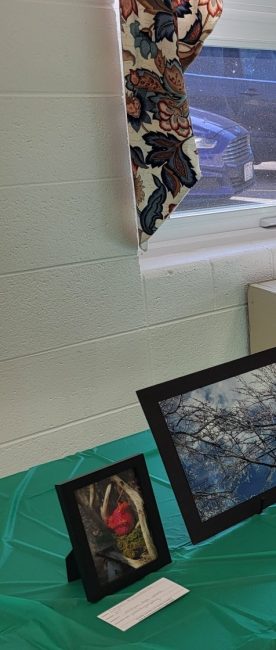
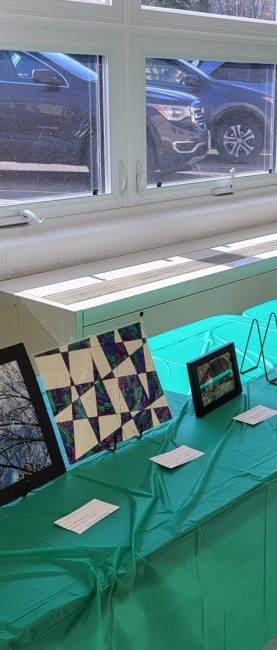
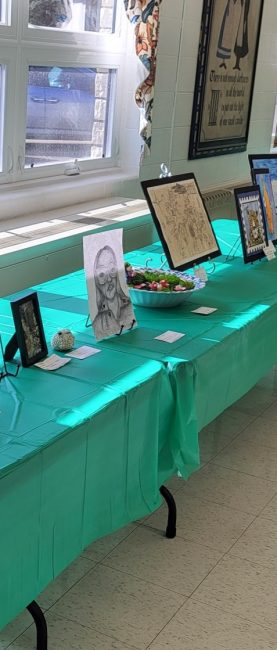
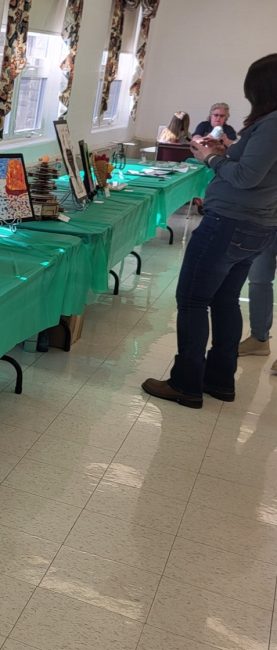
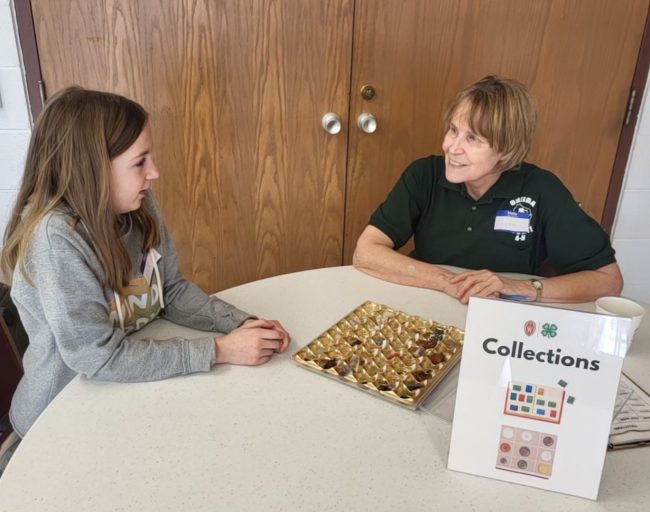
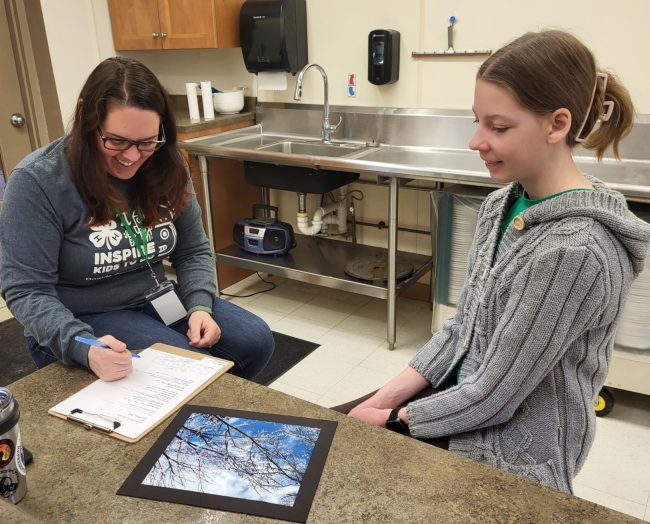
Each participant will receive an award and feedback sheet from local, experienced residents for each project entered!
Judging Groups: To Be Determined
Art
- Pen or Pencil Drawing
- Sculpture- dough or clay
- Print making
- Craft
- Painting
- Watercolor
- Crayon or marker drawing
- Multi-media drawing
- Scratch Drawing
- Paper art
- Sculpture-other media
- Recycled materials
- Any other art project not listed above.
Music Performance
- Singing
- Instrument
- Dance
- A performance by two or more youths in singing, instrument, or dance.
Drama
- Pantomine
- Reading a story.
- Acting a created or scripted character role or routine.
- Doing a clown routine.
- Doing a puppet routine.
- Two or more youth doing a drama routine.
- Anything not listed above in the category of drama/music performance.
Photography
- Seasonal/Landscape
- Animal/Bird/Insect
- Night Scene
- Action
- Sports/Hobbies
- Portrait
- Still Life
- Special Effects
- Human Interest
- Anything else not listed above.
(4×6 in size, photos may be in color or black and white)
Cake Decorating
Items will not be tasted by the judges; youth can use cardboard as a base for decorating if desired.
- Decorated Cake (the cake itself will not be judged).
- Decorated Cookie (the cookie itself will not be judged).
- Two or more cookies created as a theme together (the cookies themselves will not be judged).
- Other not listed above.
Upcycling
Creating something new from something old or from something that is considered a waste item.
- Item made from an aluminum/tin can or a jar.
- Item made from a cardboard insert (bathroom tissue, paper towels, etc.).
- Item made from craft project leftovers (not buying anything to add except glue or paint).
- Item made for the home.
- Item made to give as a present.
- Item made to sell.
- Item made for pure whimsey.
- A holiday item.
- A toy.
- An item made for a pet or outside animal.
- A musical instrument.
- An item of clothing.
- Other item not listed.
Woodworking
- Item made for inside the home.
- Item made for outside the home.
- Item made as a toy.
- Item made by recycling wood.
- Other not listed above.
Collections
- Inspirational theme to self and/or others
- Based on travel excursions
- Didn’t pay for the items
- Family owned or purchased
- Awards
- Memories
- Meant for a room or home decoration
- Brings about strong emotions
- Items are soothing
- Other reason for the collection
Yarn Work
- Article of clothing.
- Household Item
- Item for personal use (not clothing).
- Holiday Item
- Other not listed above.
Sewing
- Article of clothing.
- Household Item
- Personal Item (not clothing).
- Other not listed above.
Demonstration
Demonstration Guidelines:
A Demonstration is a “how to” for the audience. Doing a demonstration will involve public speaking.
- Try to stay within 5 minutes. A demonstration can be as short as 1 minute.
- Make your introduction interesting.
- Create a poster for your demonstration, and put the title of your demonstration on it.
- List the steps in your demonstration as you go through them. You could also write the steps/ingredients on your poster.
- Conclude your demonstration with a summary of what you demonstrated.
- Props are encouraged, as they can help explain steps in a visual way.
- At the end, you will receive evaluation comments on the following: paper/poster with demonstration title listed, introduction, organization of material, summary at the end, voice quality (speed, volume, inflection), eye contact, posture (standing straight), appropriate grooming, how interesting you made the topic, and your ability to answer questions from the judges at the end of the demonstration.
CATEGORY SUGGESTIONS: Caring for animals/plants, first-aid steps, making a recipe, what to take with you when hiking, taking care of a bicycle, caring for a young child, how to clean a musical instrument, how to decorate a room, how to identify a tree, how to organize homework, how to use a sewing machine, ways to recycle at home, and how to prepare for a day of fishing.
Only youth who sign up for “demonstration” will give a demonstration.
Watch “How to Give a Demonstration” video for further guidance (3:27 mark of video)
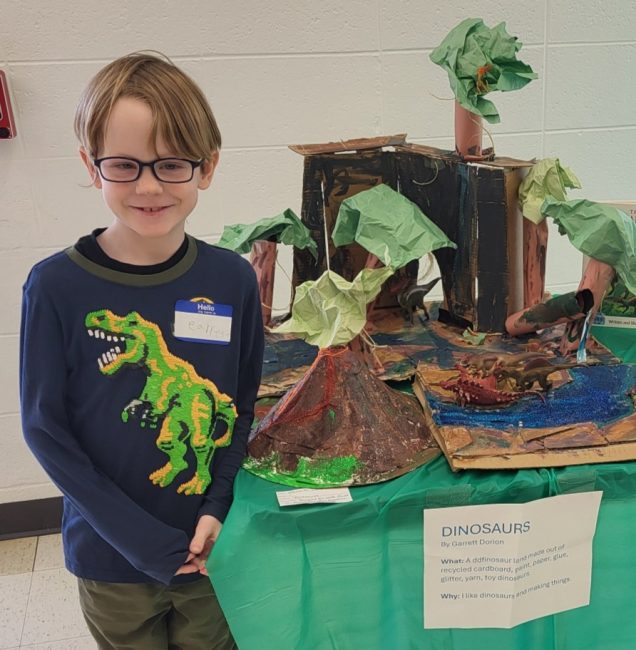
Why Should You Participate?
• To share your talents/skills.
• To challenge yourself.
• To feel good about yourself.
• To try something new.
• To meet others.
• To be with other youth who might share your interests.
Attendance
This is a face-to-face learning experience, so youth are required to be present. The Expo will end when all entries have been viewed and feedback received. Parents and friends are encouraged to come and watch!
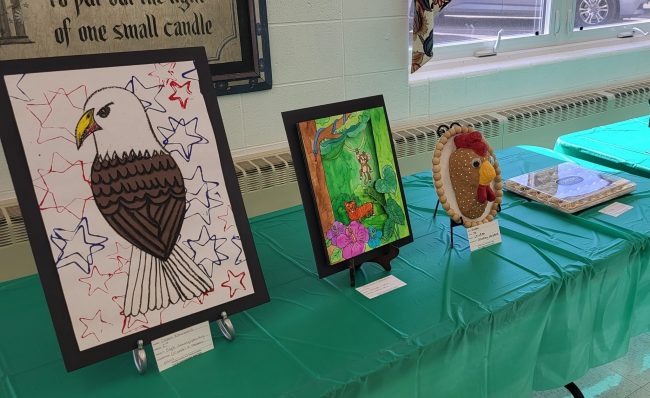
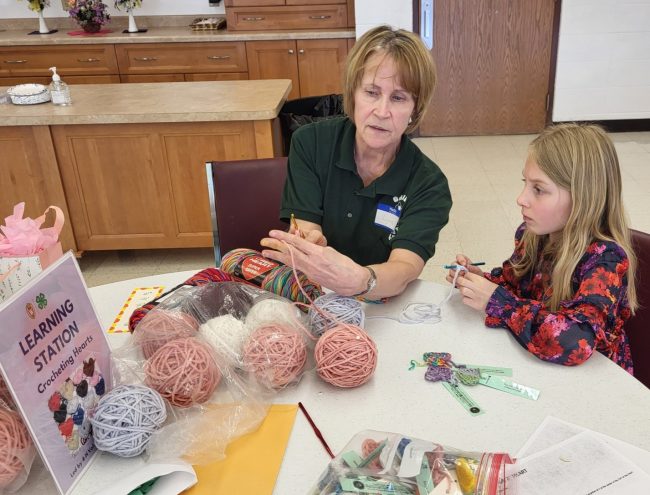
Who are the guest community members?
We will have knowledgeable community members present whose purpose will be to provide positive feedback with ideas for the youth on how to improve and grow their cultural arts work in the future. This aligns with the 4-H slogan of “Learning by Doing” and the 4-H motto of “Make your Best Better.”
Why is receiving feedback so important for youth and teens?
Oftentimes a person will complete a project to earn a grade or prize or put it away after it is finished and work on something else, but reflecting is an important step because it provides an opportunity for youth to develop logical thoughts, verbalize those thoughts, relate to others, and compare experiences. It also allows for an atmosphere of acceptance of individual participants and diverse thinking.
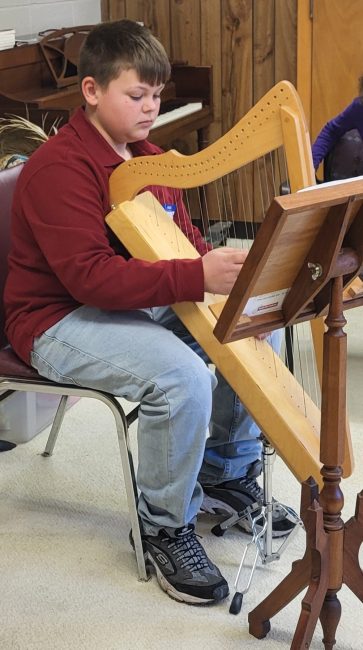
What might guest community members be asking?
This event places an emphasis on participants having fun and learning from each other by sharing knowledge and skills, evaluating themselves, and relating experiences to their own lives. Judges will be asking questions, listening to the youth carefully, helping youth reflect on their experiences, and supporting each youth’s unique learning. Youth will learn how to share and reflect upon what they did. Some of the questions may include:
- What part of their experience was the most difficult?
- What was the easiest for them?
- What problems or issues came up as they did the activity?
- How did they deal with these problems?
- What life skills did they practice?
- What did they learn about the project from the experience?
- How does what they did relate to other things in their life?
- How can they apply what they learned to future situations?
Interacting in a Group Setting
If your child is not yet ready or does not yet feel comfortable participating in a small group setting, please email apwilliams@wisc.edu or call 715-365-2750 and ask to speak with Anne, the 4-H Educator. This event is meant to be a fun learning experience. Having a conversation with the 4-H Educator before the event regarding this can be helpful for both the family and the event organizers.
Anne Williams, Oneida County UW-Extension 4-H Program Educator
Phone: 715-365-2762 Email: apwilliams@wisc.edu
Oneida County 4-H Facebook
Jessica Young, Extension Oneida County, Office Manager
Phone: 715-365-2750


